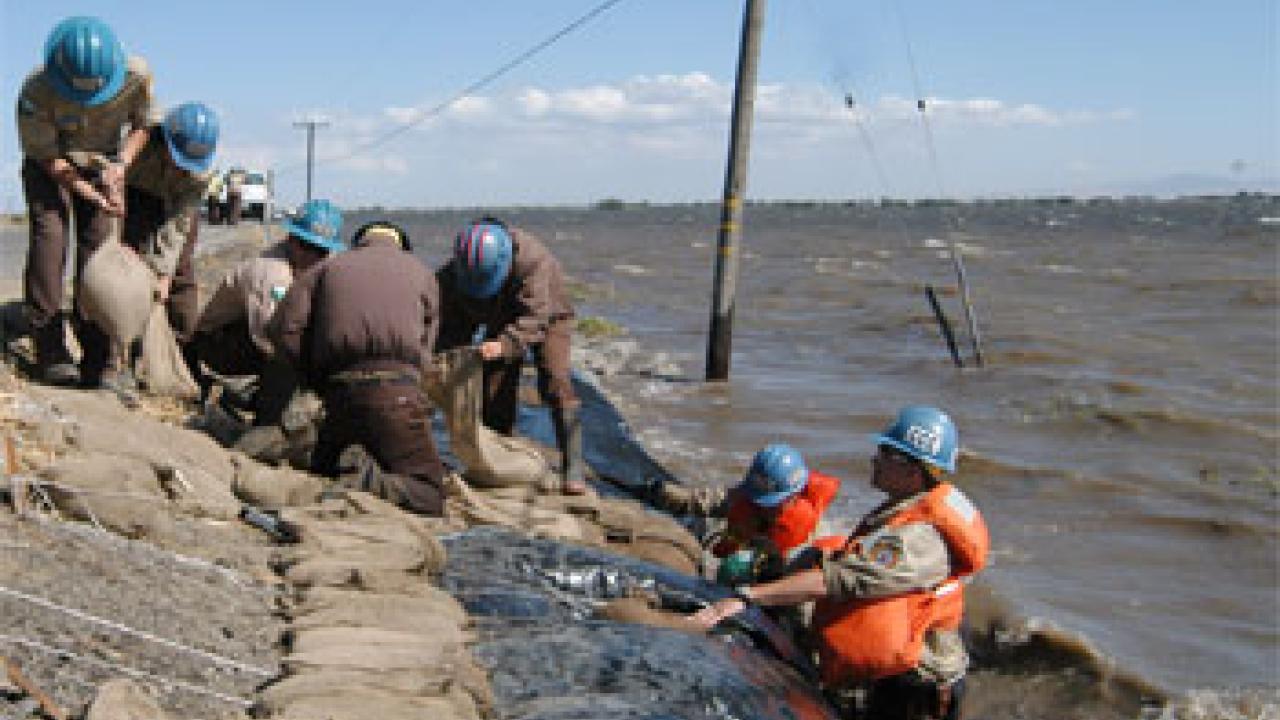Virtually every person living in California depends on the Sacramento-San Joaquin Delta for something -- water, food, energy or transportation. But the Delta is unstable and deteriorating.
Alarmed at the looming risk of a Delta -- and, therefore, a statewide -- disaster, the nonprofit Public Policy Institute of California today released an unprecedented call to action by six UC Davis and PPIC scientists.
Their 300-page report explores and compares long-term Delta solutions. The authors consider nine alternatives for Delta management and evaluate the performance of each in three key areas: water supply, environmental effects and economic costs.
In an eight-page summary of the new report, PPIC senior research fellow and program director Ellen Hanak wrote:
"Today, the Delta is changing -- because of a variety of natural and human pressures. It is now up to Californians to figure out how to manage those changes, for the health of the Delta and the state as a whole."
The five UC Davis co-authors on "Envisioning Futures for the Sacramento-San Joaquin Delta" are:
- Jay Lund, a water policy expert and a professor in the Department of Civil and Environmental Engineering;
- Jeffrey Mount, a geology professor specializing in the rivers of California and land-use impacts on watersheds, rivers and streams, and director of the UC Davis Center for Watershed Sciences, which is a program of the John Muir Institute of the Environment;
- Peter Moyle, the leading authority on California native fishes and a professor in the Department of Wildlife, Fish and Conservation Biology;
- Richard Howitt, a water economist and a professor in the Department of Agricultural and Resource Economics; and
- William Fleenor, an expert on water quality in natural and engineered systems, and a professional research engineer in the Department of Civil and Environmental Engineering.
At a series of morning news conferences to release and discuss the report, the UC Davis researchers acknowledged that their role as outside experts could actually expedite the process of addressing the Delta.
"We hope that we'll take the political hits and this will allow the (state) agencies -- the people who direct the agencies -- to allow their professionals to look at some of these alternatives," Howitt said.
Added Lund: "It's our job at the university to come up with new ideas and new ways to think about things that are hopefully helpful."
Californians rely on the Delta for a host of essential services, including: drinking water, produce and livestock raised on Delta water, goods shipped over its highways and railways, and gas and electricity carried in its pipes and transmission lines.
Yet the Delta is increasingly threatened by floods, earthquakes, sinking land, rising sea level, regional climate change, invasive species and urbanization. And CALFED, the government agency charged with solving the Delta's problems, is itself challenged by problems of underfunding and internal dissent.
"After Hurricane Katrina, people realized that catastrophic collapse of these levee and water systems is a very real possibility," Howitt said. "This not only can happen but almost certainly will happen. There's a 64 percent probability of something like this happening in the next 50 years. That's too high for public infrastructure."
The study says that the cost of a single episode of Delta failure could reach $40 billion and would cause severe disruptions to California's water supply. That would affect drinking water for millions of people and agricultural animals, such as the state's huge dairy herd, as well as irrigation water for food crops and water supplies for industry.
The authors challenge the long-held perception -- and public-policy cornerstone since 1930 -- that the Delta is a naturally stable freshwater system and should be maintained as such.
In fact, they write, the Delta in its natural state was subject to strong tidal cycles and other fluctuations in water quality. Only parts of the Delta were mostly fresh year-round; others were naturally brackish (salty) either seasonally or during dry years.
"The belief has been that we're defending the environment by maintaining the freshwater system, but that is actually incompatible with giving the Delta's native species and ecosystem a fighting chance to survive and prosper," Hanak said.
The study concludes that there is a dire need to develop new and innovative management policies to sustain the Delta, and analyzes and evaluates a range of options.
Some key findings and recommendations:
- Although changes will result in some significant costs and dislocations, most users of Delta services can adapt economically.
- Strong political and institutional leadership is needed to address the Delta crisis. Since mid-2006, the body responsible for coordinating CALFED, the Delta's joint federal and state program, has been operating without independent authority or budget.
- Scientific work in the Delta needs to be refocused. Levee replacement, experiments in adapting the ecosystem, flood control and island land management should be key components of a new problem-solving framework.
- Direct beneficiaries of the Delta should be primarily responsible for financing solutions and should make up-front commitments. Public funds should be reserved for the truly public components of any investment. Moreover, in the wake of a natural catastrophe, an effective funding mechanism will be essential to avert financial disaster for state and local interests.
The full report is available at: http://www.ppic.org.
About the Public Policy Institute of California
The Public Policy Institute of California is a private, nonprofit organization dedicated to improving public policy in California through independent, objective, nonpartisan research on major economic, social and political issues. The institute was established in 1994 with an endowment from William R. Hewlett.
About UC Davis
The University of California is one of the world's foremost research and teaching institutions, and UC Davis is the University of California's flagship campus for agricultural and environmental studies. UC Davis is a global leader in solving problems related to air and water quality; water and land use; agricultural practices; endangered and invasive plants and animals; climate change; resource economics; information technology; and human society and culture.
Media Resources
Jay Lund, Civil and Environmental Engineering, 530-752-5671, jrlund@ucdavis.edu
